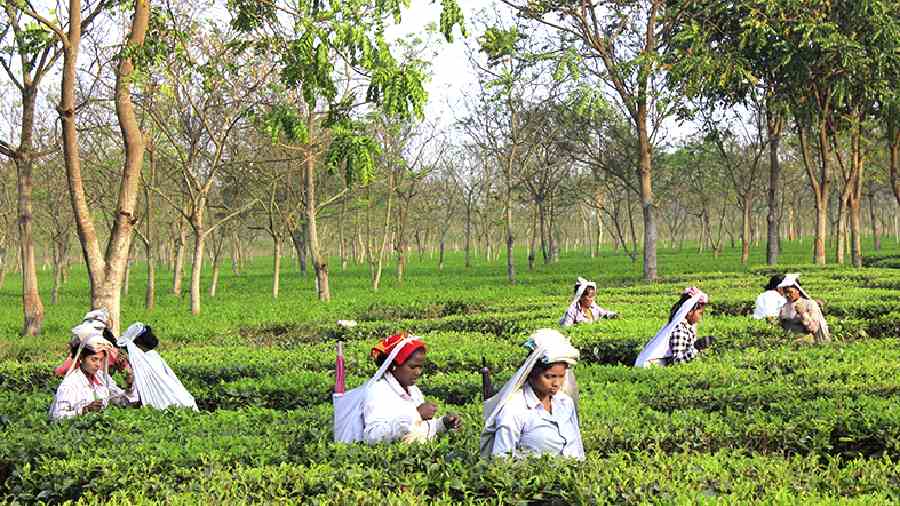
Bengal govt seeks tea planter view on land rights
Don't Miss
The tea planters had raised several technical issues over the granting of land rights to the workers in their meeting with the chief secretary following which the state has asked to file a response
Vivek Chhetri | TT | Darjeeling | 24.02.23 : The Bengal government has asked the tea industry to submit its views within 14 days on the administration’s decision to provide land rights to workers after the planters raised “severe apprehensions” about the move.
Chief secretary H.K.Dwivedi and other senior government officials held a meeting with representatives of the tea industry from the Darjeeling hills, the Terai and the Dooars in Siliguri on Wednesday, where the decision to provide land rights to the labourers came up for discussion.
“We have been asked to submit our views to the state government in writing within 14 days after planters expressed several apprehensions over the government’s decision,” said a source.
Chief minister Mamata Banerjee had on Tuesday handed over land right documents to 1,000-odd workers in the hills and the plains of north Bengal. She also announced that the government would make sure that all workers living in the tea gardens were provided with pattas within six months.
Around three lakh workers serve in the tea industry in north Bengal. During their meeting with the chief secretary, sources said, the tea planters had raised several technical issues over the granting of land rights to the workers.
“Technically, the tea gardens are governed by the Plantation Labour Act, 1951, where we are mandated to provide quarters to the workers. If the workers are being given pattas, then the Act, too, needs to be amended,” said a planter.
The sources said the planters had also raised questions on the fate of the industry if the labourers who were provided with pattas failed to join work and upon their retirement, the immediate relatives didn’t turn up either.
In the tea industry, the job of a labourer is given to the next of kin, which ensures a pool of workers. It is another story that members of the new generation do not want to work as tea leaf pickers and absenteeism is as high as 40 per cent in the hill gardens.
“Are we to set up more labour lines (if new workers are engaged)? Where are we to find new land to set up these quarters? Again, will granting of land documents be a continuous process, resulting in us using land for labour quarters continuously?” a planter was quoted to have asked at the meeting.
Many planters have also expressed reservations over gardens having “islands”, which are not directly under their control. “Such areas would not be in the interest of the industry and could lead to friction between the residents and the planters,” said a planter.
Another planter pointed out that when tea companies hypothecated gardens to financial institutions, everything, right from bungalows to factories to labour lines, are evaluated. “How the lenders would react to the land right decision is another issue,” said the planter.
The sources said Dwivedi had promised to look into the issues raised by the planters. “The state administration has also assured the planters of going in for a joint survey with the management for the demarcation of land to be resumed,” said a source.
Since tea garden land is leased out to the management, the government has to first resume the land to itself before the same can be distributed to workers. “We have been told that the government is yet to formulate guidelines on this issue,” the source said.
While the planters have raised several questions on the granting of pattas to labourers, the tea belt is divided on the merit of the land documents that the state is distributing. The government has announced that it will distribute homestead pattas which cannot be transferred, sold or gifted. The plot can only be inherited by direct descendants after the death of the landright holder.
Also, the ceiling of the land with the homestead patta is 8.2 decimal. Many in the hills have argued that several workers in the tea gardens have been in possession of more than 8.2 decimals for generations.
Darjeeling BJP MP Raju Bista said: “We have our ancestral land and we have our homes also. What we don’t have is the documents of our land. We do not want land meant for the landless and the homeless.” Many have, however, pointed out that until now, workers in the tea gardens had no land rights at all and several of them have less than eight decimals of land under their possession.


0 Response to " Bengal govt seeks tea planter view on land rights"
Post a Comment
Disclaimer Note:
The views expressed in the articles published here are solely those of the author and do not necessarily reflect the official policy, position, or perspective of Kalimpong News or KalimNews. Kalimpong News and KalimNews disclaim all liability for the published or posted articles, news, and information and assume no responsibility for the accuracy or validity of the content.
Kalimpong News is a non-profit online news platform managed by KalimNews and operated under the Kalimpong Press Club.
Comment Policy:
We encourage respectful and constructive discussions. Please ensure decency while commenting and register with your email ID to participate.
Note: only a member of this blog may post a comment.